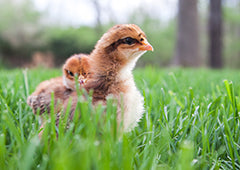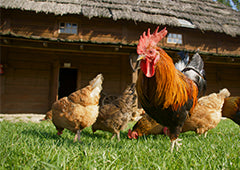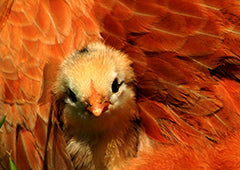If you’re using a broody hen to incubate some fertile eggs, then they need a little more TLC than normal. Broody hens always put the health of their eggs before their own needs - therefore you need to take egg-stra special care of them to ensure they stay healthy!
Here are some things you can do to ensure your broody hen has a peaceful, comfortable incubation period, and brings healthy chicks into the world!
Feed and water them regularly
This seems painfully obvious - but it is really important to ensure that your broody hen is consuming food at least once a day. Broody hens consume 80% less feed than when in their normal state, which means they are at risk of malnutrition.
Keep a private feeder and waterer close to the broody hen so she can access it without straying too far from her eggs. If she doesn’t seem to be eating anything at all, try giving her some treats to spur her appetite - the high calories will help restore the nutrients she is lacking in faster. Also, ensure her water is always fresh and available to her whenever she needs it.
A safe environment for her to sit on the eggs
Broody hens need to have their own space where they can sit on the eggs, out of the way of everyone else. Giving them a private area, such as their own small coop, makes the incubation process much less stressful - there’s no egg laying, feather ruffling or nesting to disrupt the broody hen.
Keep the nest clean
Keeping the nest clean is essential - otherwise the fertile eggs the hen is sitting on may become soiled and go bad. Change the bedding regularly, getting rid of any poop, broken eggs or fowl smelling eggs that may be in the nest.
Try not to interfere
The more a broody hen is interrupted, the more likely she is to quit sitting on her eggs and abandon them throughout the hatch. Definitely not the desired result! Monitor her to ensure that she’s getting enough nutrition, and change the bedding when she’s out- try and keep any other contact to a minimum. We know it’s hard, but sometimes it’s best to cheer for your hen from the sidelines.
Your broody hen really does need your support during this egg-citing time - she’s doing her best to look after the precious cargo, and gearing up to teach them all about life as a chicken.
To give your hen some peace of mind and room to tend to their new arrivals, getting them their own coop is a great way to ensure they’re comfortable. The Cluck House or the Taj Mahal is the perfect size for a new family to make a home in.
Whether your hens are doing the work or you're looking into incubation equipment to start your own flock, bringing new life into the world is a joyful and eggstraordinary experience for the whole family. Nothing compares to seeing fluffy little hatchlings peck out of their shells. Getting to this perfect moment does come with a fair few challenges and risks which can be stressful and overwhelming, especially without the right information.
This is why I recommend our friends at Chickenpedia to all of my readers. They have created the brilliant Hatch A Plan course to help you successfully incubate and hatch happy and healthy chicks. Their course offers the best advice to ensure you build your knowledge to avoid tragic disasters, as these little ones can be so sensitive to temperature! You can learn about the conditions and equipment needed to confidently bring new life into the world.
As chicken keepers, we want to do an eggcellent job when caring for our feathered friends. Many chicken keepers struggle to handle chicken health or behaviour issues, especially in the first few years of having a flock. Chickenpedia have comprehensive online courses on everything you didn’t know you need to know and then some more! From raising baby chicks to feeding and behavior, you’ll find beginner-friendly courses that’ll give you the knowledge and confidence to successfully look after your chickens for years to come.
These courses are exclusive to members only, so flock to Chickenpedia today!


















